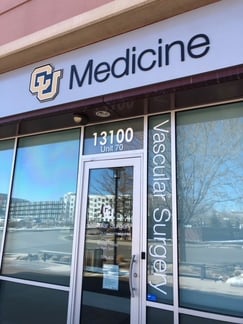A new vascular surgery clinic opened in February on the Anschutz Medical Campus in Aurora, offering easy access for patients with venous disease, peripheral artery disease, and mesenteric and renal artery disease. The clinic also offers hemodialysis procedures for arteriovenous fistula and graft maintenance.
"This clinic is for procedures we don’t have the perfect venue for currently,” says Donald Jacobs, MD, chief of the Division of Vascular Surgery and professor of surgery at the University of Colorado School of Medicine. “There are some straightforward, minimally invasive procedures we’re currently doing in the hybrid operating room, which is a very high-tech facility.”
Moving some of those simpler procedures to a standalone clinic, Jacobs says, will provide lower cost of care and better patient experience in a smaller but fully equipped facility.
"We have the latest in imaging guidance equipment for doing catheter and wire, and endovascular procedures for treating peripheral arterial disease and venous disease, mostly in the extremities, but also blockages of the kidney arteries or bowel arteries,” he says. “The advantage for patients is that they can park less than 150 feet from the door or get dropped off at the curb. They can get set up for the procedure, do the intake and IV, get the procedure, and be done and go home in half the time the process would take in the hospital.”
The vascular surgeons are all trained in the latest clinical trials and treatments. Jacobs says advances in vascular treatment using special catheters and wires that are able to cross long blockages in the legs provide high success and durability of treatments not seen before. Newer plaque removal procedures such as modified peripheral laser atherectomy, which uses a laser to unblock arteries, can allow minimally invasive treatment of total artery blockages without open surgery. If there is a need for surgical treatment of complex disease that is not able to be done in the new office procedure suite, the surgeons are able to provide seamless care of such procedures in the hospital.
“The nice thing about the clinic is that it’s a small team, you have a personal relationship with the people who are treating you, and the facility is much more user friendly,” Jacobs says. “Studies show that standalone clinics have much higher patient satisfaction.”




.png)
.png)